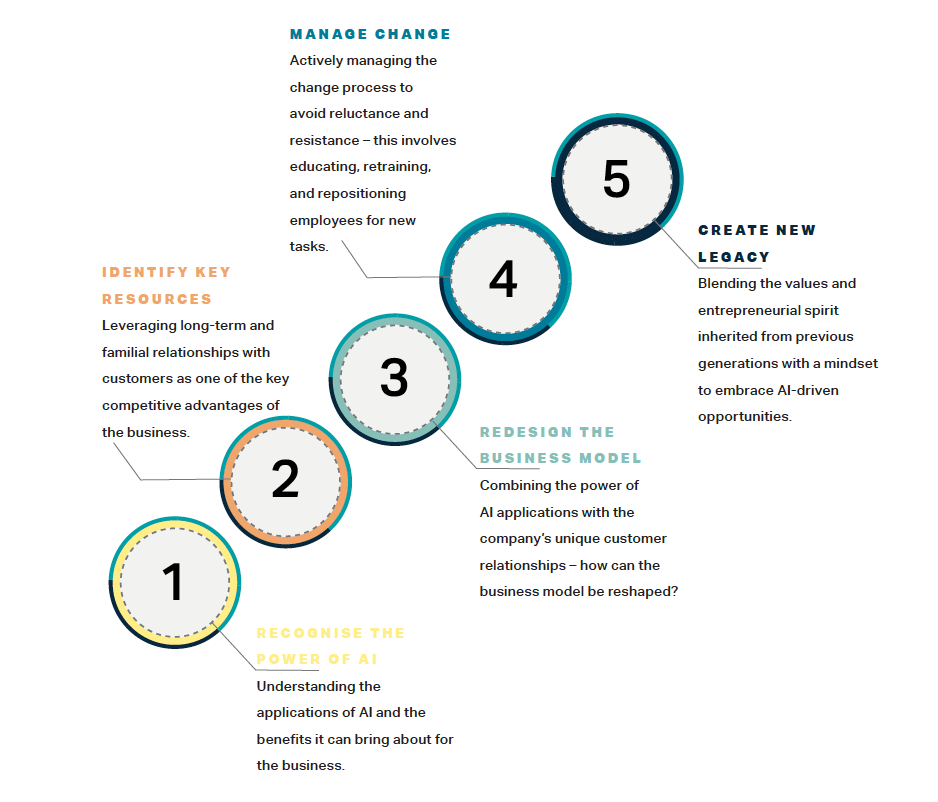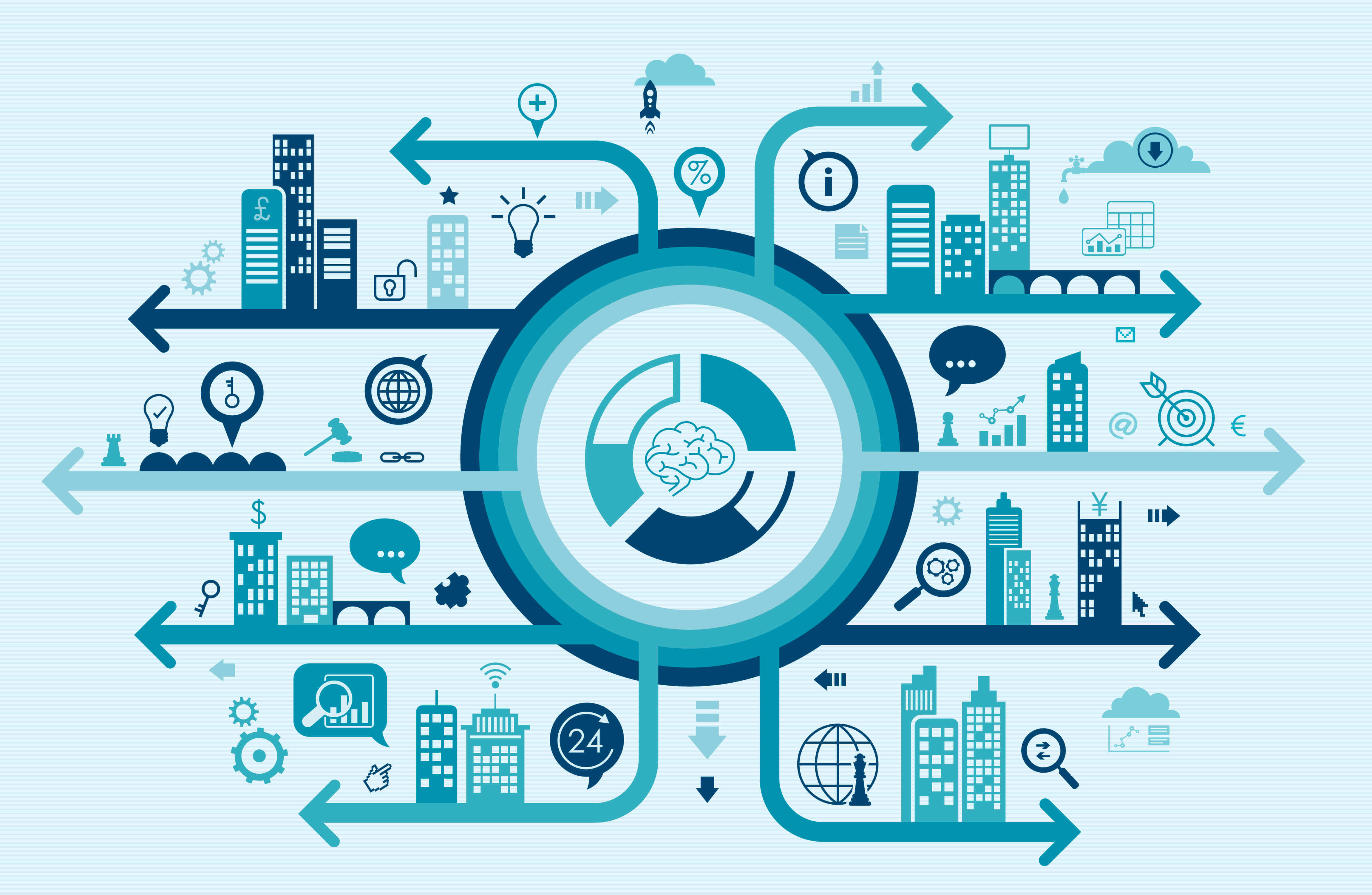
Ann Sophie K. Löhde
Associate CEO at aiso-lab GmbH, Senior Research Fellow at WIFU Witten Institute for Family Business

Dr Giovanna Campopiano
Associate Professor of Family Business at Lancaster University Management School, Director of the LUMS Centre for Family Business, Senior Research Fellow at WIFU Witten Institute for Family Business
The Rise of AI – Why Now?
Artificial Intelligence (AI) – everybody is talking about it, but not many understand it, and only a few know how to use it to their advantage. The basic idea behind AI is simple. Machines are now able to perform tasks that we thought only humans could successfully master. With increasing computing power, however, we are able to program machines in a way that enables them to learn from experience and adapt to new inputs. Computers can be programmed to fulfil many tasks in a manner similar to humans but with the capability of processing more substantial amounts of data.
The question often arising in this context is about where the current “hype” is coming from and whether it might be just that – a “hype”. The technological ideas behind AI can be traced back to the early 1920s. The algorithms were invented decades ago, yet the topic has reached the attention of the masses only recently. The main drivers behind these sudden “leaps” are the advancements in processing power and the success of Google’s AlphaGo in 2017, which was not considered possible by experts around the world even just a few years ago.
The Impact of AI on Business
As with many technological advancements, AI provides tremendous benefits for businesses and is changing our workplace environment permanently. It will have a high impact on business functions – thus internal processes – as well as products and offerings. In particular, business functions such as administration, marketing and sales, production and research and development will benefit from AI applications in the short term by increasing productivity and efficiency. However, in the long run, entire business models will be disrupted. AI does not only impact how a firm works but also what it offers to its customers.
Whereas, so far, one of the key differentiating factors for companies is still the quality of their products and services, a shift towards business models that mainly build on customer relationships (fully integrated solutions or platforms) is taking place. Production processes powered by AI offer a high level of optimisation to various manufacturers. In this scenario, the competitive advantage will stem
from the relationship with and a deep understanding of the customers and their specific needs.
 AI and Family Firms
AI and Family Firms
For family firms, this shift in paradigm towards an integration of AI poses an exceptional challenge to family firms, as it might mean that they have to detach themselves from their family legacy and often centuries of tradition to sustain their business over time. On the other hand, family businesses possess a strong competitive advantage in these new market conditions. Whereas many business functions can be optimised through AI applications, creativity and personal relationships require capabilities that are still uniquely human. And family firms have long been known for their familial customer relationships, often lasting over generations.
Incoming generations are facing the challenge of detaching their traditional business from its past and – so far – successful model to embrace the novel opportunities offered by AI. The emotional attachment to what has been created and implemented by their ancestors might be a hindrance to this inevitable change.
Family businesses might also find it difficult to reposition their workforce, often considered part of the family, in the business models resulting from AI applications. However, once the renewed value of close and personal customer relationships is understood, family businesses have the chance to benefit from unique advantages when innovating their business models towards AI-driven customisation and tailor-made solutions.
Towards a New Sustainable Family Business Model
By integrating AI solutions into their operations, family business owners can significantly impact current business strategies and activities. An overall cultural change and restructuring of the business is necessary in the light of the breakthroughs AI is engendering. Family businesses might redirect their efforts towards devoting more attention to their stakeholders, establishing a value-based governance system at different levels and building a long-lived and viable business model for future generations.
In doing so, family firms can revitalise the sustainability of their business model both at the business and family level. AI radically affects strategic and operational decisions. The implications for family business sustainability condition the profitability of the business as well as the values and shared vision of the family. Although this disruption and the resulting internal dynamics may dismantle the status quo, family businesses can use it to earn a competitive advantage and regenerate their sustainability.
 AI and Family Firm Stakeholders
AI and Family Firm Stakeholders
The revolution AI drives into family businesses deeply affects stakeholder management. Both employees and external actors, who affect and can be affected by the business activities, play a significant role in the definition of a new, sustainable family business model. Customers, suppliers and competitors have to be under the screening lens of firm managers at all times. To reap every business opportunity that the implementation of AI offers, the main focus should be on satisfying customers’ needs and building even stronger relationships with them, as well as strengthening synergies with suppliers and maintaining an advantage over competitors.
Employees might face a difficult time when their roles are partially or completely replaced by machines, which can perform many tasks more efficiently and effectively. However, family businesses are usually reluctant to lay people off, as they consider them part of the family. As such, family firms might consider alternative ways to reposition their employees, redesigning the overall structure and the individual roles of both family and non-family members.
[ms-protect-content id=”4069,4129″]</p>
AI and Family Firm Governance
AI can pose serious concerns to the governance systems and mechanisms within both the business and the family, but there are several ways to overcome this challenge. To help re-evaluate the current strategies of the company, family business owners can invite advisors to be part of the board of directors, to offer counselling on the trends that are changing the market and possible solutions. Managers and employees, who can help motivate other members of the company to work together proactively towards new common goals, can be empowered to lead and drive the structural changes that will ensure business success.
This process might prove difficult if there are no clearly communicated values and principles that spill over from the family to the business. Shared values, which the family matures in family meetings or councils, can convey a sense of identity to all employees, facilitate their commitment and engagement in the business, redirect managers’ focus on relevant issues and guide their core decisions.
AI and Family Firm Longevity
Succession processes and family involvement over generations present an opportunity for family businesses to embrace the power of AI and reshape their business model in the long run. As family firms treat longevity as a superordinate goal, each new generation has to redefine the business to prepare it for future challenges. Family firms and their owners are therefore familiar with the process of redesigning their business model and are capable of strategically assessing it to be viable over several decades. This is a core strength that family firms can leverage in the light of the disruptions AI is imposing on traditional business models.
Accepting the disruptive power of AI and creating a business model for the future that overcomes AI-related challenges and leverages its full potential requires both family and non- family members to shift their attention towards redefining their positions and roles in the business. In so doing, they shape the legacy of the family in a way that ensures its longevity.
Recommendations for Family Business Owners
Family business owners should consider the implications of AI-related disruptions in the family, business strategies and operations. In the face of the repercussions on the survival, structure and relationships that characterise the legacy of a family business across generations, both family and non-family members play a relevant role. Nurturing this legacy becomes a challenge that can be successfully navigated under the guidance of family business owners, who are required to reflect on the key pillars discussed above.
Family firms can minimise the negative impact of disruptions and take advantage of all the benefits AI offers by:
- Designing a new sustainability paradigm that acknowledges human relationships, both outside and within the family business, as a core resource.
- Radically restructuring
the business model and establishing a governance system that enables a fruitful communication at the business and family-level. - Rethinking the concept of family legacy to encompass a culture of change, nurturing values and goals that build on heritage and simultaneously embrace a new sustainable model.

[/ms-protect-content]



 AI and Family Firms
AI and Family Firms AI and Family Firm Stakeholders
AI and Family Firm Stakeholders










